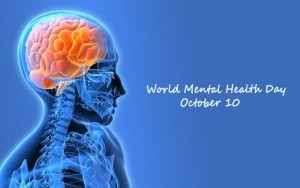World Mental Health Day is a day for global mental health education, awareness and advocacy, first celebrated in 1992. It’s an initiative run by the World Federation for Mental Health.
This year’s theme set by the World Federation for Mental Health is psychological first aid and the support people can provide to those in distress.
Here are 10 tips which can be of help
1. Eat a Diet High in Nutrients
Nutrients in foods support the body’s repair, growth, and wellness. Nutrients we all need include vitamins, minerals, carbohydrates, protein, and even a small amount of fat. A deficiency in any of these nutrients lead to our bodies not working at full capacity — and can even cause illness.
2. Fill Your Plate With Essential Antioxidants
Damaging molecules called free radicals are produced in our bodies during normal body functions — and these free radicals contribute to aging and dysfunction. Antioxidants such as beta-carotene and vitamins C and E combat the effects of free radicals. Antioxidants have been shown to tie up these free radicals and take away their destructive power.
Studies show that the brain is particularly at risk for free radical damage. Although there’s no way to stop free radicals completely, we can reduce their destructive effect on the body by eating foods rich in antioxidants as part of a healthy diet, including:
Sources of beta-carotene:apricots, broccoli, cantaloupe, carrots, collards, peaches, pumpkin, spinach, sweet potato.
Sources of vitamin C:blueberries, broccoli, grapefruit, kiwi, oranges, peppers, potatoes, strawberries, tomato.
Sources of vitamin E:margarine, nuts and seeds, vegetable oils, wheat germ.
3. Eat “Smart” Carbs for a Calming Effect
Don’t shun carbs — just make smart choices. Limit sugary foods and opt for smart carbs, such as whole grains, fruits, vegetables, and legumes, which all contribute healthy carbs as well as fiber.
4.Balance your blood sugar and avoid stimulants
Your intake of sugar, refined carbohydrates, caffeine, alcohol and cigarettes, as well as stimulant drugs, all affect the ability to keep one’s blood sugar level balanced. On top of this common antipsychotic medication may also further disturb blood sugar control.
5.Methylation, B12, folic acid and B6
Methylation is a critical process in the brain that helps maintain the right chemical balance. An indicator of faulty methylation is having a high level of a toxic amino acid in the blood called homocysteine. The body makes homocysteine from dietary protein and, provided you are getting enough of certain vitamins, especially folic acid, B12 and B6, homocysteine levels decrease. High levels of homocysteine and low blood levels of folic acid have been reported by many research groups.
6.Vitamin B6, zinc and pyroluria
Possibly one of the most significant ‘undiscovered’ discoveries in the nutritional treatment of mental illness is that many mentally ill people are deficient in vitamin B6 and zinc. But this deficiency is no ordinary deficiency: you can’t correct it by simply eating more foods that are rich in zinc and B6. It is connected with the abnormal production of a group of chemicals called ‘pyrroles’. A person with a high level of pyrroles in the urine needs more B6 and zinc than usual, since they rob the body of these essential nutrients, increasing a person’s requirements to stay healthy, this was reported by Brain Bio Centre.
7.Check for allergy
Some people with mental health problems are sensitive to gluten, especially wheat gluten, which can bring on all sorts of symptoms of mental illness. This has been known since the 1950s, when Dr Lauretta Bender noted that schizophrenic children frequently had coeliac disease (severe gluten allergy).Include other grains like rice, jowar, ragi, maize, bajra.
8. Include Omega-3 Fatty Acids in Your Diet
Recently, scientists have revealed that a deficit of omega-3 fatty acids is associated with depression. In one study, researchers determined that societies that eat a small amount of omega-3 fatty acids have a higher prevalence of major depressive disorder than societies that get ample omega-3 fatty acids.
Sources :fatty fish (anchovy, mackerel, salmon, sardines, shad, and tuna), flaxseed, and nuts.
9. Watch Your Lifestyle Habits
Many people who are depressed also have problems with alcohol and/or drugs. Not only can alcohol and drugs interfere with mood, sleep, and motivation, they can also affect the effectiveness of your depression medications.
These substances temporarily give you a lift, but actually deplete and blunt valuable hormones in the long run. Avoid the stimulant cycle.
In addition, drinks and foods containing caffeine can trigger anxiety and make it difficult to sleep at night. Cutting out caffeine or stopping caffeine after noon each day can also help you get a better night’s sleep.
10. Exercise to feel good.
Exercise is a natural stimulator of many important “mood” hormones, including serotonin and dopamine. Don’t think of exercise as a chore to lose weight or prevent heart disease “someday”. Realize that 15 or 20 minutes of exercise every day will naturally release these feel-good hormones that are so vital to feeling happy and calm.Exercise is about feeling good, not just looking good. Even just a simple WALK will do.
Providing the body with the nutrition it needs is a positive step individuals can take toward combating their condition. With adequate nutrition, we are all better prepared to face the challenges of the day.








Hi! A friend with my Twitter community contributed this website here and so I went to look it over. I absolutely enjoy the details. I am bookmarking and will also be tweeting this one to my followers! Useful blog and outstanding design and style.
thanks a lot